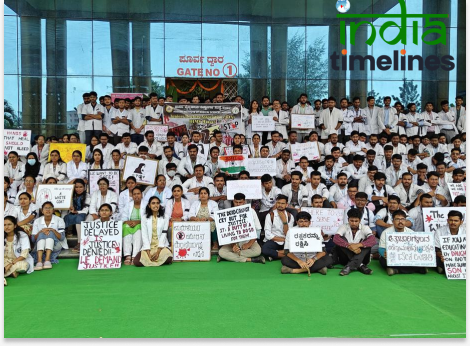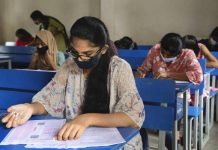
In response to the tragic rape and murder of a trainee doctor at a Kolkata hospital, Indian healthcare workers have launched a massive nationwide strike. The tragic incident, which involved the brutal assault and killing of a 31-year-old doctor, has prompted widespread protests and a 24-hour shutdown of hospitals and clinics across the country.
The victim was discovered on August 9 in a bloodied state at the RG Kar Medical College and Hospital, where she had been working an exhausting 36-hour shift. An autopsy confirmed that she had been sexually assaulted before her death. The news of her murder ignited a wave of outrage, leading to a significant response from the medical community and the general public.
On the day of the strike, starting at 6 a.m. local time, hospitals and clinics across India were forced to turn away all non-emergency patients, with only emergency services remaining operational. Faculty members from medical colleges stepped in to handle urgent cases. The Indian Medical Association (IMA), representing around 400,000 medical professionals, condemned the “barbaric” crime and criticized the inadequacy of safe working conditions for both medical workers and women at large.
Protests took place in various cities, with healthcare workers, students, and citizens demanding justice and improved safety measures. In Kolkata, protesters, including Antara Das, a medical student, expressed their fear and frustration, questioning their safety in what should be a secure environment—the hospital. A poignant sign held by one protester read, “Hands that heal shouldn’t bleed.”
The brutal nature of the crime, committed within the seminar hall of a medical college, has amplified calls for systemic change. The IMA’s statement highlighted the need for stronger protections for healthcare workers and called on the government to take decisive action to prevent such incidents in the future.
In response to the incident, doctors across various Indian cities, including Lucknow, Ahmedabad, Guwahati, and Chennai, joined the strike, reflecting the widespread anger and concern within the medical community. In New Delhi, Sapna Rani, a 27-year-old doctor, emphasized the dire conditions under which medical professionals work, noting the often extended 36-hour shifts and inadequate resting facilities. This underscores the broader issues within the healthcare system that exacerbate the risks faced by doctors and other medical staff.
Rakhi Sanyal, a professor at the West Bengal University of Health Science and a practicing doctor in Kolkata, voiced her condemnation of the murder and demanded justice. She stressed that ensuring the safety of healthcare workers should be a priority for the administration.
The strike also called for the implementation of the Central Protection Act, which aims to safeguard healthcare workers from violence. Protesters are pushing for more stringent legislation that would classify attacks on on-duty medical staff as serious offenses, with no option for bail. Akanksha Tyagi, a gynaecologist in New Delhi, lamented that it took such a horrific event for attention to be drawn to the issue of violence against doctors.
One individual has been detained in connection with the crime, and the investigation has been escalated to federal authorities following allegations of mishandling by state officials. This case highlights the broader issue of underreported crimes against women in India, where stigma and a lack of trust in law enforcement often deter victims from coming forward. According to the National Crime Records Bureau (NCRB), over 31,000 rapes were reported in India in 2022, underscoring the scale of the problem.
Amidst the protests, one rally in New Delhi featured a poster that boldly declared, “Enough is enough.” This sentiment reflects the growing frustration and demand for meaningful change from both the healthcare community and the public. The strike and subsequent protests are not only a response to the specific tragedy but also a broader call for a safer, more supportive environment for all healthcare workers and women across India.
Healthcare Workers Demand Systemic Change After Kolkata Tragedy
The recent nationwide strike by Indian doctors and healthcare workers is a powerful testament to their collective frustration and demand for systemic reform following the heinous rape and murder of a trainee doctor in Kolkata. The 31-year-old victim, who had been working a grueling 36-hour shift at the RG Kar Medical College and Hospital, was discovered in a state of violence and sexual assault on August 9. This tragic event has served as a catalyst for widespread protests and a significant mobilization of the medical community across India.
The strike, which began at 6 a.m. and lasted for 24 hours, saw hospitals and clinics across the country scale back services, focusing only on emergency cases. This action was not just a show of solidarity but also a stark reminder of the harsh working conditions faced by medical professionals. Doctors across major cities, including Lucknow, Ahmedabad, Guwahati, and Chennai, participated in the shutdown, highlighting a unified stance against the lack of safety measures and the general disregard for their well-being.
Also Read :- Why Kolkata Doctor’s Rape-Murder Case Went To CBI: Court’s Tough Remarks
In addition to demanding justice for the murdered doctor, the protests have spotlighted the dire need for better protection for healthcare workers. Calls have been made for the implementation of the Central Protection Act, which aims to provide legal safeguards against violence directed at medical staff. Protesters are also advocating for stricter laws to make attacks on on-duty medical personnel punishable with severe penalties, including no bail options for perpetrators. This tragic incident has exposed systemic issues within the healthcare system and has fueled a broader movement for comprehensive reforms to ensure the safety and dignity of those who dedicate their lives to caring for others.


































trezor.io/start